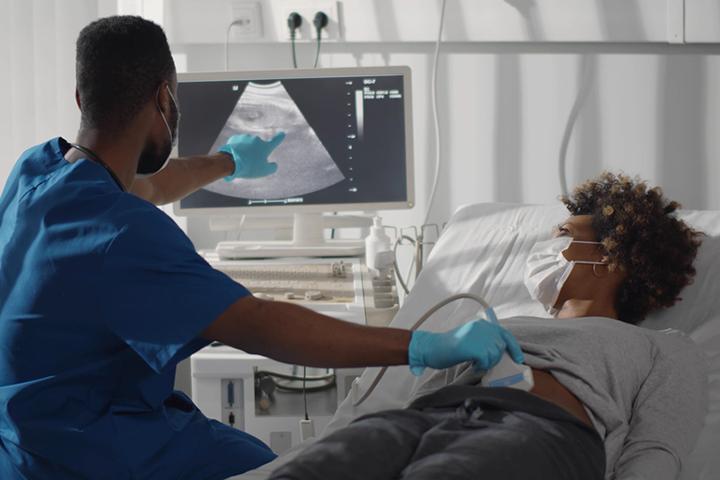
Image: Shutterstock
Pregnancy can be the most exciting time of your life, but it can also feel surreal at times. Although your body is growing and changing to accommodate your new little family addition, and your hormones are all over the place, it can be hard to really fathom that you are going to have a baby. For most parents, things become extremely real when they first hear their baby’s heartbeat. It helps them feel connected to their little one and hastens their anticipation to meet their special bundle of joy. So, not only is listening to your baby’s heartbeat an indication that they are healthy and developing well, it can also bring you closer to your baby, which is why it is so important. So, if you’re wondering when you will get to hear your baby’s little beating heart, we’ve got some answers for you. Read on to know more!
When Does A Baby Have A Heartbeat?
If you have an early ultrasound exam, you may be able to see the beating of cells in a heart tube as early as 6 weeks into your pregnancy. This is because, around week 5 or 6, there’s a flickering of cells within the embryo’s torso which initiates the development of the heart tube. Keep in mind that at this point the heart is not anywhere close to the four chambered organ that it will eventually become. It is nothing but a tube shaped structure that will develop slowly. This heart tube will bend and twist to form a heart and its chambers. And because the heart isn’t developed fully yet, the American College of Obstetrics and Gynecologists (ACOG) defines this movement as “cardiac activity” rather than a heartbeat. What a pregnant woman may hear or see is the ultrasound machine translating electronic impulses that signify fetal cardiac activity into the sound that we recognize as a “heartbeat”. But it is not truly a heartbeat until the heart is fully formed. Thankfully, a baby’s heart is one of the first structures to fully form as it is charged with delivering oxygenated blood and nutrients to other developing organs.
What Does A Fetal Heartbeat Sound Like?
Image: Shutterstock
Many women often compare their baby’s heartbeat to the sound of a galloping horse. This is because the embryonic and fetal heartbeat is fast, about 110 to 160 beats per minute. If you hear a whooshing sound, this is not a heartbeat. This is usually caused by movement or the monitor traveling past the placenta. Another misconception that pregnant women have, is that if they hear two heartbeats, it means they are having twins. This isn’t always the case. Most of the time, the second heartbeat is just your heartbeat in the background. If the heart rate of the embryo or fetus is healthy, it’s a sign that development is progressing normally. Once you see or hear your baby’s heartbeat, you are mostly in the clear as the risk of having a miscarriage at this point, that is, week 6 is less than ten percent. And this goes down to 1 percent after week 9!
What If Your Provider Can’t Detect A Heartbeat?
There are a few reasons as to why your doctor or midwife may not be able to detect your baby’s heartbeat in the first trimester. For starters, it may just be too early in your pregnancy and your due date may be off. This can especially be the case if your menstrual cycle was irregular to begin with. Your provider will schedule another ultrasound in a week or two, so there’s no need to panic. You could also have a retroverted uterus which means that the position of your uterus makes it harder to detect a heartbeat as it is further away. You might have a hard time hearing the heartbeat if you are overweight. Extra padding between the ultrasound wand and the baby may make it harder to detect the heartbeat. You may also have an Ectopic pregnancy. In this case, an ultrasound wouldn’t pick up heart motion in the uterus because there’s no embryo there. It is important to note that an ectopic pregnancy is a surgical emergency that can be fatal if not treated quickly. Or you could have had a miscarriage. If cardiac activity was detected and now isn’t or if a heartbeat cannot be detected when expected, this may be a sign of a miscarriage.
How You Will Hear Your Baby’s Heartbeat
Image: Shutterstock
A fetal Doppler, which is a handheld ultrasound device will be used by your provider to check your baby’s heartbeat. This will happen at every prenatal visit after 10 weeks. This procedure is painless and any slight discomfort experienced will be due to the cooling effect of the ultrasound gel applied to your stomach or the slight pressure of the doppler pressing your lower abdomen to find a strong heartbeat.
If you can’t hear your baby’s heartbeat right away at week 6, there is no need to panic. Give your pregnancy time to progress and ensure that you are eating and resting well. You will hear your baby’s little heart soon enough!
Sources
1. What is the “normal” fetal heart rate?, NCBI
2. Fetal cardiac function during the first trimester of pregnancy, NCBI















